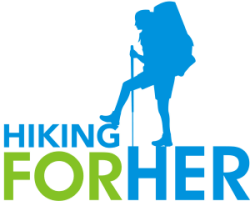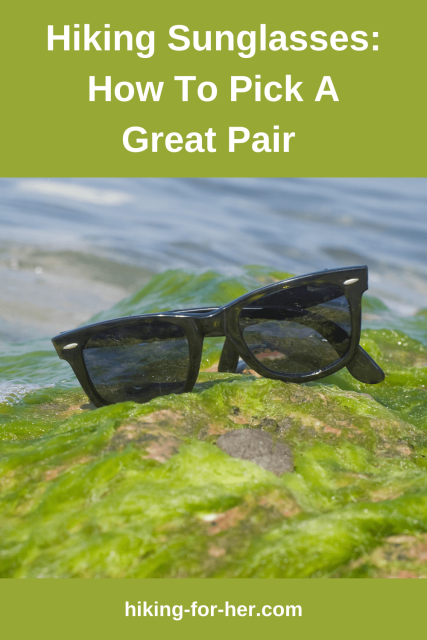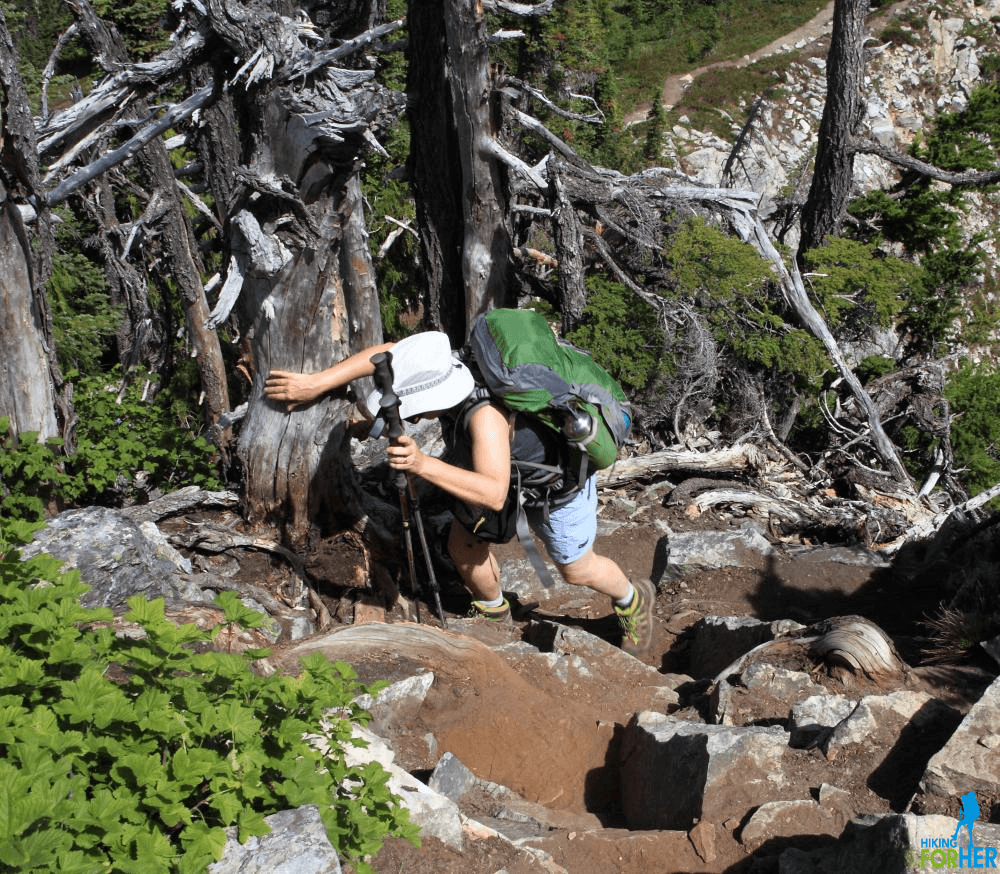Hiking Sunglasses:
How To Wear The Right Pair
By Diane Spicer
Hiking sunglasses serve a dual purpose:
- They must block UV rays, AND
- block any potential trail hazards dangling in your face (including those pesky spider webs early in the morning)
Okay, there's one more reason to wear sports sunglasses: to look great as you sweat up a storm!
Why eye protection for hikers is a must do
Your eyes are well designed to gather light rays and focus them at the back of your eyeball, giving you crisp, clear vision on the trail.
But is there such a thing as "too much" light?
In a word, Yes!
It's important as a hiker to protect your eyes from too much light, ultraviolet rays in particular, by using the best outdoor sports sunglasses.
Why?
Your eyes can accumulate long term damage, clouding the lenses and leading to vision problems (cataracts) in the future.
Besides, squinting sucks!
- Think of the wrinkle prevention you're accomplishing by donning a pair of stylish hiking sunglasses.
Combine shades with the best sunscreen and you're going to be a beautiful hiker with great vision for a LONG time.
What to look for in lenses
All sunglasses will cut down on some of the light your eyes get blasted with on an 8 hour hike in high summer.
Or on a snow field any time of the year at high elevation.
But you want maximum eye protection.
So shop for a pair of hiking sunglasses which block almost all (preferably 100%) of Ultraviolet A and Ultraviolet B rays while preventing up to 90% of visible light from entering your eyes.
Trail tip:
Combine a wide brimmed hiking hat with a quality pair of sunglasses, and you'll block a crazy amount of UV radiation from entering your eyes!
- Tips for best hiking hats here
Did you know this about hiking sunglasses?
The color of the lenses in the sunglasses matters.
Some colors are better suited for trail conditions than others.
So it's important to wear the right shades for the environment and weather you prefer to hike in, year round.
That might mean owning more than one pair of hiking sunglasses!
I do, because I'm a year round hiker who enjoys both flat terrain and high alpine hiking.
Polarized lenses: heads up
Polarization can allow you to see beneath the surface of water.
It also makes colors crisp and vivid as it cuts glare.
But there's a drawback to polarized sunglasses: they make LCD screens nearly impossible to see.
So your camera, smart phone, and car screens will be no gos when you're wearing those glasses.
Make sure your hiking sunglasses
fit your face
The fit matters, too.
So that's the third purpose: looking good!
Nice and snug is better than loose and floppy, as long as it's not too nice and snug (leaving painful gouges on your nose or behind your ears).
Try on lots of pairs of hiking sunglasses, and allow a trained salesperson or optometrist to give you just the right fit.
Choose a business which allows you to come back to tweak the fit, or to replace nose pads when they wear out.
Just say no to cheap
throwaway sunglasses
I strongly advise you to avoid the sunglasses sitting on a counter at a department store.
They might be fine for a few quick day hikes, but I'd question the quality as well as the marketing hype.
- Do they really block 100% of UV rays for that cheap price?
- Will they stand up to the grit and pounding of the trail?
At most, use these tempting displays of sunglasses to figure out which frame shape looks best on your face, but don't purchase a pair and expect the glasses to stand up to hard trail usage day after day.
Also consider the fact that a high quality pair of hiking sunglasses will perform well for years, keeping cheap plastic junk out of landfills.
Hard trail usage choice
The lenses in your glasses must stand up to all sorts of hiking conditions, like these examples:
- dirt and grit on the lenses,
- corrosive sweat,
- occasional water
dunkings during stream crossings,
- greasy sunscreen accumulations,
- water spots from rain and fog,
- being
dropped onto rocks or mud,
- cold winter conditions of snow and ice,
- hard breezes to outright gales,
- and whatever else you throw at your hiking gear.
One more thing: if you're bushwhacking, the lenses might have to withstand scratching from branches.
Polycarbonate lenses are the way to go when you hike in extreme terrain.
Here's an example of sunglasses that can stand up to punishment:
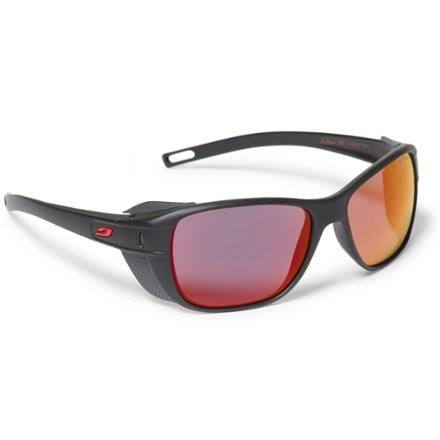 Julbo Camino Spectron 4 Sunglasses
Julbo Camino Spectron 4 Sunglasses
Cleaning your lenses
Be careful when you clean all that stuff off the lenses: you might end up scratching the lens yourself!
I carry a small microfiber cloth like this with me for cleaning purposes.
Trail tip: It's a good idea to buy a multipack, and stash them in every backpack and jacket pocket. Use them to clean your camera lenses, too.
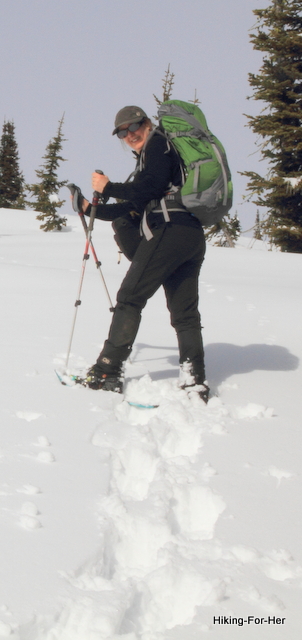 Hiking sunglasses should be used year round. Blocking UV rays on the snow keeps your corneas out of trouble.
Hiking sunglasses should be used year round. Blocking UV rays on the snow keeps your corneas out of trouble.
Best hiking sunglasses for
prescription lens hikers
Just for the record, I wear prescription glasses which automatically turn dark when I'm outdoors.
I love that I don't have to switch between glasses,
which was a nuisance when I used clip-ons or had a separate pair of prescription sunglasses.
This transitional darkening feature is handy most of the time.
Where I run into potential trouble is walking through dark forested stretches of trail after being in bright sunlight.
- The lenses take awhile to adjust, and I hate the wait time because I can't see the trail very well, making me prone to stumbling.
- Also, in really bright conditions, I can't see the buttons on my camera and I have to look over the top of the "glasses turned sunglasses", which gives me a jolting blast of sunlight which sometimes hurts my eyes.
Full disclosure: I can't blame the looking-over-the-top thing entirely on the sunlight. Part of it is my multi-focal lenses necessary for my aging eyes.
One more rant: The lenses fog over in winter conditions, leaving me vision-compromised.
So carefully consider whether or not "transition" lenses fit your hiking lifestyle.
They are definitely a mixed blessing, but in the end I endorse using them based on convenience.
Sunglasses that fit over prescription lenses
are a thing
If you already wear glasses but don't want transitional lenses, how about purchasing hiking sunglasses to fit over your prescription pair of lenses?
In really sunny conditions I wear a pair of sunglasses called FitOvers right over my transitional lenses!
It pays to investigate that option here before purchasing a pricey pair of pretty eye protectors.
Lots of non prescription sunglasses for hikers
to choose from
As with any other hiking gear, you get what you pay for.
And you want to pay for glasses that stop glare, block UV rays, minimize the amount of sunlight reaching your eyes, fit well, and look good.
Too much to ask? Nope!
Here's a company that makes decent sunglasses for hiking, with plenty of options for frames and lenses.
Hiking with glasses:
tips for prescription lens wearers
If you need to wear eyeglasses as a hiker, you already know about fogging up, sliding down and lots of other trail issues.
Here are my suggestions for hikers with glasses.
I don't want your sunglasses!
True story: Your hiking sunglasses look way better on you than me!
After all that work to find the perfect pair, don't put your sunglasses on a rock and then walk away.
Every summer hiking season I count at least 5 pairs of sunglasses (some of them with prescription lenses), left behind by inattentive hikers.
I used to take them back to the trail head and leave them in a conspicuous place.
- Now I just let Mother Nature & the elves have them.
Maybe you should be using a lightweight cord around your neck?
That's how I keep mine year after year ;)
Home page > Best Hiking Gear >
Best Hiking Sunglasses
